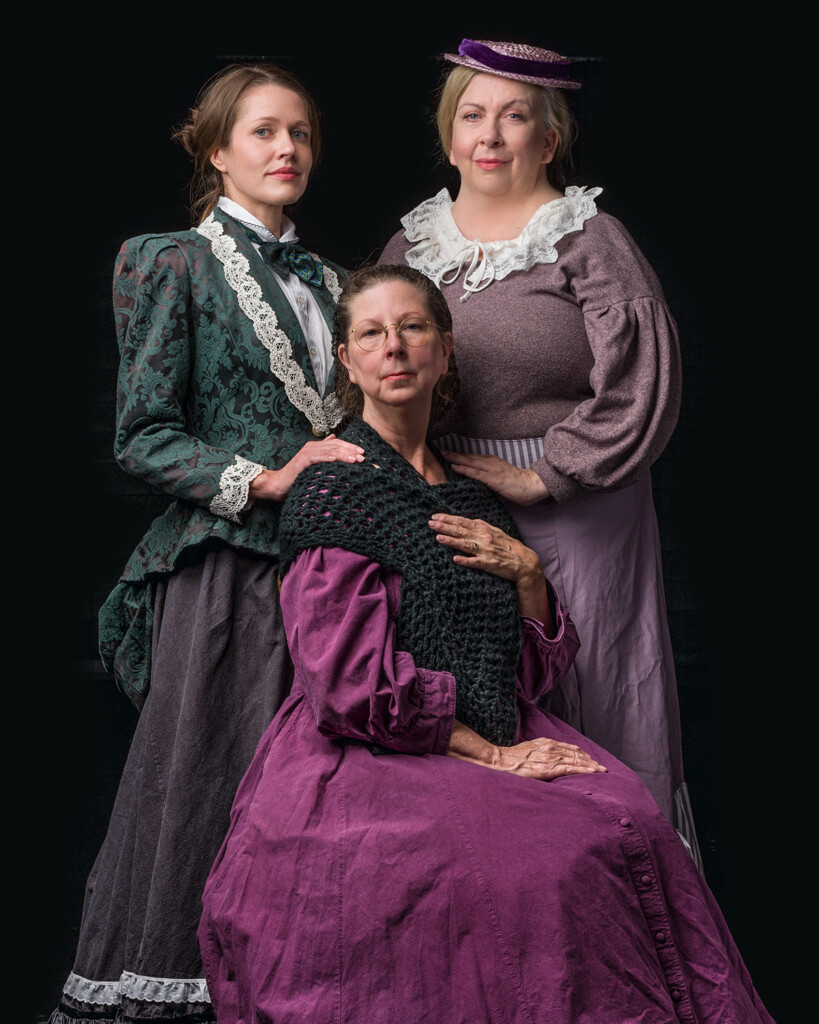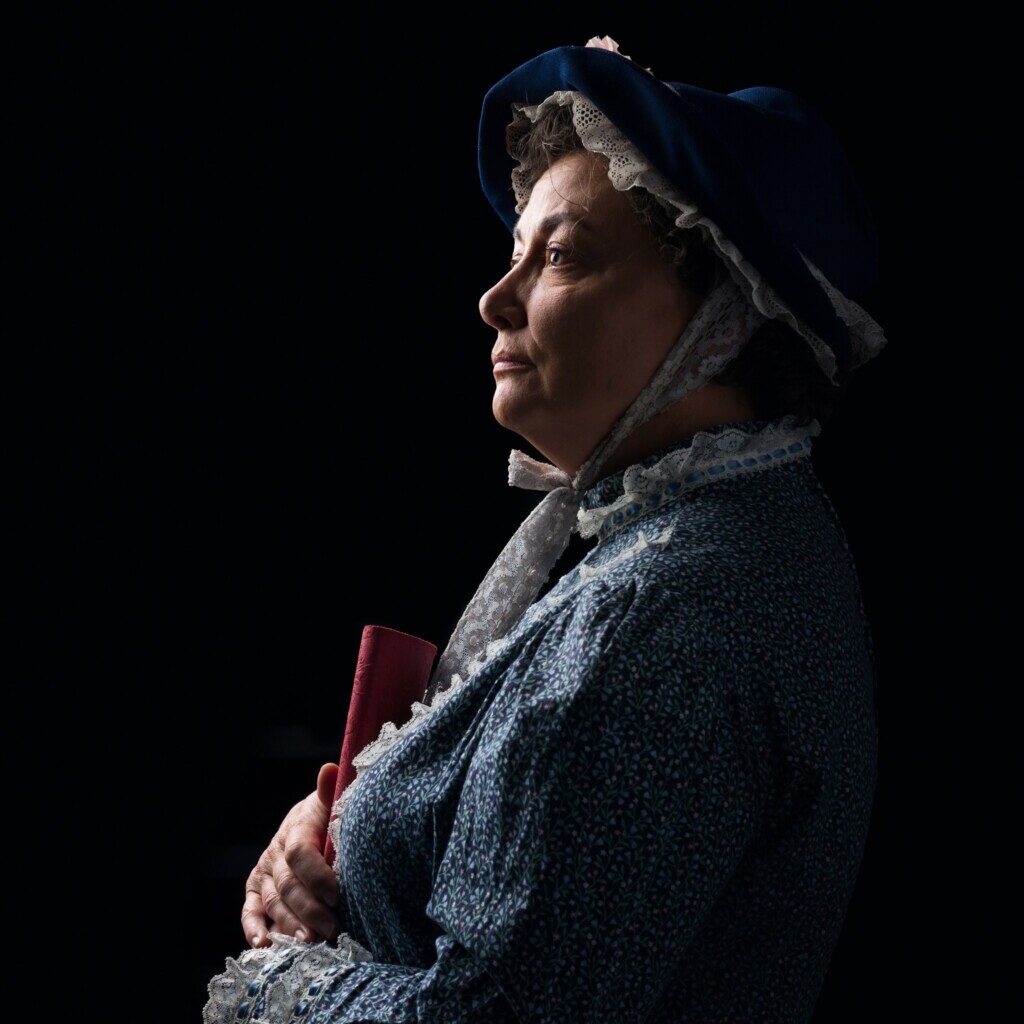When a play’s story arises from events or figures of Utah history, playwright Julie Jensen, whose works have been produced outside of Utah more frequently than any other local playwright, always succeeds in crafting a credible fictional narrative with a scrupulous eye toward framing the script’s framework with historical accuracy. In her award-winning play, Two-Headed, the historical backdrop was the Mountain Meadows massacre in the 19th century. The two main characters in that play contended with their individual and collective tests of conscience, friendship and identity against the backdrop of the massacre, its memories, and the practice of polygamy.
The same scrupulous sense of history is evident with Mother, Mother: The Many Mothers of Maude, her latest work, directed by Fran Pruyn, which has received a very good premiere in the season opener for the Pygmalion Theatre Company. Colleen Baum, in particular, shines in the anti-heroine role of Annie Adams, who had hopes of making it big in the world of theater when she started acting in the 1860s. But, it was Adams’ daughter, Maude Adams (played by Nicole Finney) who found fame and was often acknowledged among the greatest performers on the American stage during the late 1800s and early 1900s. As noted in a previously published preview, despite never having found even a fraction of the stage fame that her daughter had amassed, Annie stayed solid and resilient in her lifelong love of the theater, which started in her teen years during the 1860s.
Baum handles deftly the tricky demands of speaking the lines which are cast in elevated language that would have been familiar to 19th century audiences in the theater. She steps into the role of Annie convincingly. While the volume of historical source material about Annie pales in comparison to what has been written about her famous daughter, there is still enough evidence to document just how ambitious Annie was and how her love for the theater was a lifelong affair.
And, that passion was evident from her girlhood days in the mid-1860s. In an early scene, Annie laments, “There is nothing else for a girl to become. Except a writer of novels, which is piling boredom on top of boredom, or a teacher of children, which is nonsense upon nonsense. I would much rather be an actress upon the stage.” Baum picks up on the rhythm, knowing which words to exaggerate or stress for elevated effect. Meanwhile, Julia (Barb Gandy) tells her in a deadpan way, “You could be a mother. It runs in your family.”
The play moves swiftly in its 90 minutes. There are four acts and 17 scenes but the pauses between each are handled quickly, given the minimalistic stage setting. In one scene, Annie meets her friend, Martha Hughes Cannon (Tamara Howell), another famous Utahn who was a physician, polygamist and the first woman in the U.S. to be elected a state senator. While it was unlikely that the two women were childhood friends (given the fact that Annie was nine years older than Martha), the pair’s appearance in the play serve to demonstrate the different paths both women took in fashioning their respective mavericks in the history of Utah women.

Annie talks about her “glorious future” with curtain calls and roses being tossed on stage as appreciation for her performance, as the audience cheers, claps and stamps their feet on the floor. Then, Martha says, “This is my future. I am all alone in a cavernous room. It is cold and drafty. Sounds echo. I am cutting into a cadaver. It makes a sound. I want to flee but I may not, because I am a woman, and I may not show fear.”
Likewise, Darryl Stamp also handles skillfully the elevated language in the five male roles, including Uncle Big (as in Brigham Young), Charles Frohman (a New York City theatrical producer) and Arthur Brown, Utah’s first U.S. senator, the theater director in a Nevada mining camp and a Utah farmer. He switches character effortlessly, especially in the scene as Senator Brown, with whom Annie is having an affair.
The actors stress the various lines of counterpoint that pop up in the motherhood thematic arc. Julia was set in her pioneer ways and worried about whether or not Maude, her granddaughter, would be educated properly. The play hints that Maude’s relationship with her grandmother was good. Even in her infancy, Maude already had appeared on stage.
Baum and Finney handle their scenes together with excellent impact. Annie relishes the melodrama of the theater where the character dies on stage while Maude wants “fun parts,” especially male roles. The two mavericks have their sharpest exchange in the last scene of the third act, when Maude announces that she is changing “the rules governing the relationship between men and women.” It is rich in irony, when one considers the relationship Annie has had with her mother. Annie tells Maude, “Might as well try to change the tides or control the weather.” Maude simply says, “We both knew this day was coming.” Annie refuses to reply but merely says, “I wish I had a mother like yours”:
MAUDE
And what would you ask of her?
ANNIE
I would ask her what to do,
And she would tell me,
And I would do it,
And it would all be all right.
MAUDE
Except that you have never taken anyone else’s advice.
ANNIE
Because no one else ever knew enough.
MAUDE
No one else ever knew enough
to tell you anything.
ANNIE
No one else ever had my life.
How could they tell me what to do?
I had to create my own life.
MAUDE
And in exchange
you have a right to create everyone else’s life?
ANNIE
No, just yours.
The play covers Annie’s life up to death in 1916. The final scene is unexpectedly poignant in its irony. It puts a fine point on why this play is as much a bittersweet ode to the theater as it is to the complexities of mother-daughter relationships.
The play’s run continues through Nov. 19 in the Black Box Theatre in the Rose Wagner Center for Performing Arts. For tickets see the Pygmalion Theatre Company website.



